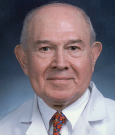The American Society of Hematology (ASH) will recognize the late Aaron J. Marcus, MD, of Weill Cornell Medical College and the Veterans Affairs New York Harbor Healthcare System with the 2015 Wallace H. Coulter Award for Lifetime Achievement in Hematology. Dr. Marcus, who passed away in May 2015, will be honored for his groundbreaking research in hemostasis and thrombosis and his unwavering dedication to the field throughout his nearly 60-year career.
The Wallace H. Coulter Award for Lifetime Achievement in Hematology is named for the late Wallace Henry Coulter, a prolific inventor who made important contributions to hematology and to ASH. The award commemorates Mr. Coulter’s innovative spirit, visionary leadership, and entrepreneurship and is bestowed on an individual who has demonstrated lifetime achievement and leadership in education, research, mentoring, and practice. ASH President David A. Williams, MD, will present the award to Dr. Marcus’ children on Sunday, December 6, during the 57th ASH Annual Meeting and Exposition in Orlando, Florida.
5-Decade Career
Dr. Marcus began his medical career in 1953 after earning his medical degree from New York Medical College. Following medical school, he completed an internship at the Jewish Hospital of Brooklyn and served as a resident and fellow at Montefiore Hospital in New York.
From 1958 until his death, Dr. Marcus served as Chief of Hematology-Oncology at the Veterans Affairs New York Harbor Healthcare System and as Attending Physician at New York-Presbyterian Hospital. In 1973, Dr. Marcus began work at Weill Cornell Medical College, first serving as Professor of Medicine, then as Professor of Medicine in Pathology and Professor of Pathology and Laboratory Medicine.
Over the course of his long career, Dr. Marcus made many contributions to hematology, specifically in the area of hemostasis and thrombosis. His pioneering study of platelets laid the foundation for modern antithrombotic therapy for heart attack and stroke. His research on cell-cell interactions led to the concept of transcellular metabolism and the discovery of “thromboresistance,” a term he coined to describe how platelets are incapable of being activated by known platelet agonists.
Dr. Marcus’ recent research focused on a new compound, CD39, that he hoped would one day become a novel, effective, and safe therapy for arterial diseases. ■


